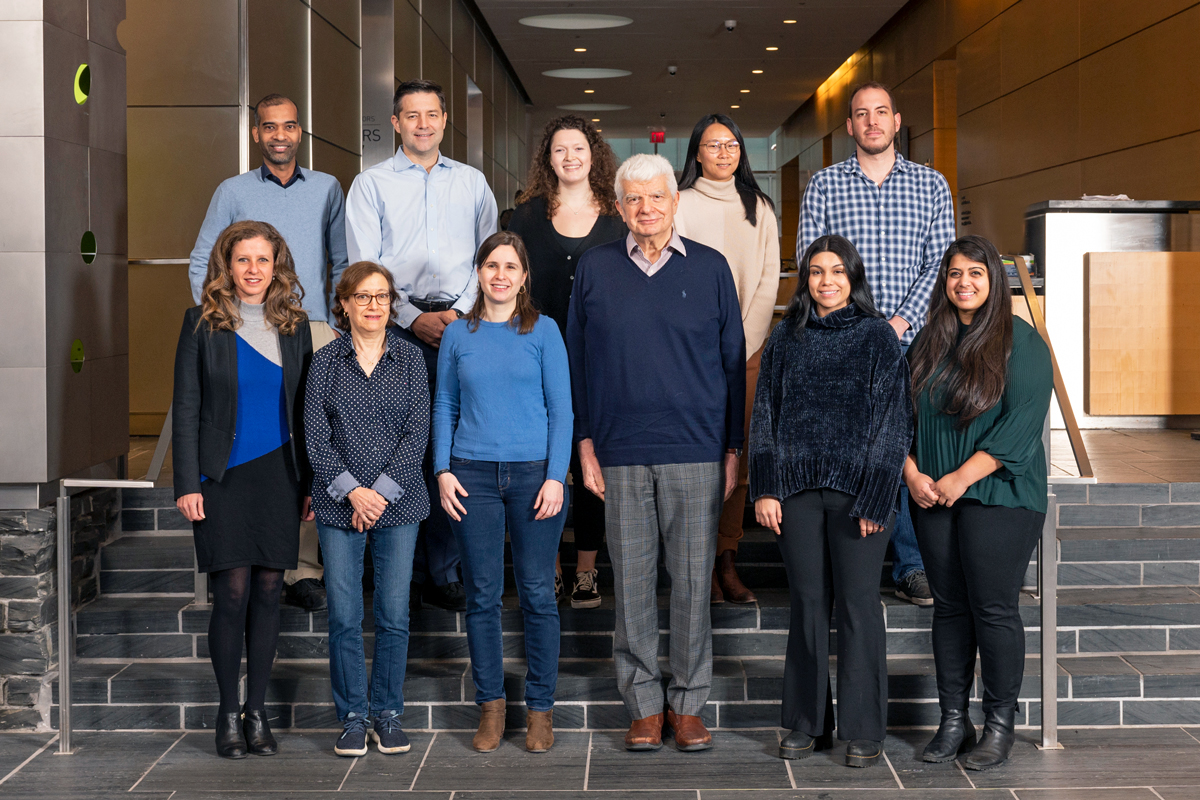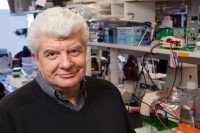The James Fagin Lab
Research

The focus of the Fagin lab is to understand the pathogenesis and the biology of thyroid cancers at single cell resolution with the goal of identifying new mechanism-based therapies. His group has been instrumental in characterizing somatic genetic changes associated with tumor initiation and progression in radiation-induced and sporadic thyroid cancer, and in defining their functional consequences. He showed that selective MEK and RAF kinase inhibitors restored thyroid differentiation and responsiveness to radioactive iodine in GEM models of the disease, which led to the development of innovative clinical trials showing significant promise of this therapeutic strategy. His group also defined novel mechanisms of adaptive resistance of BRAF-mutant thyroid cancers to MAPK pathway inhibitors. The improved efficacy of one of these approaches, the co-targeting of RAF and HER2/HER3 has recently been confirmed in phase II trials. In addition to these studies, the lab is currently working in the following areas:
- Investigation of the role of the HIPPO pathway as a rheostat regulating adaptive resistance to small molecules targeting the MAPK pathway in thyroid cancer and other cell lineages.
- Advanced thyroid cancers have increased frequency of mutations of genes encoding chromatin remodeling proteins, including several members of the SWI/SNF chromatin remodelling complex. His group is systematically exploring the impact of individual Swi/Snf and histone methyl transferase disruptions on the chromatin and transcriptional landscape of thyroid cancers in GEMM. Current evidence indicates that they lock thyroid tumor cells into an undifferentiated state that can no longer be reversed by MAPK pathway blockade, while creating new and unanticipated therapeutic vulnerabilities.
- A hallmark of anaplastic thyroid cancers is their heavy infiltration with T cells and myeloid cells. He is investigating how profound MAPK pathway inhibition reprograms these tumors at single cell resolution. The lab is also investigating how cell autonomous antigen presentation and the tumor microenvironment contribute to promote T cell cytotoxicity. In a related project, his group is collaborating with the Levine lab to investigate whether tumor-infiltrating myeloid cells harboring mutations of Tet2, Dnmt3a or Axsl1, which are hallmarks of clonal hematopoiesis, confer refractoriness to therapy in GEMM with Braf-driven ATC.
- The Fagin and Nai-Kong Cheung labs are collaborating to develop bispecific antibodies to target unique changes in the membrane proteome of thyroid cancers in response to MAPK pathway blockade.

Featured News



Publications Highlights
Pathogenesis of cancers derived from thyroid follicular cells. Fagin JA, Krishnamoorthy GP, Landa I. Nat Rev Cancer. 2023 Sep;23(9):631-650. doi: 10.1038/s41568-023-00598-y. Epub 2023 Jul 12. PMID: 37438605
Genomic and Transcriptomic Characteristics of Metastatic Thyroid Cancers with Exceptional Responses to Radioactive Iodine Therapy. Boucai L, Saqcena M, Kuo F, Grewal RK, Socci N, Knauf JA, Krishnamoorthy GP, Ryder M, Ho AL, Ghossein RA, Morris LGT, Seshan V, Fagin JA. Clin Cancer Res. 2023 Apr 14;29(8):1620-1630. doi: 10.1158/1078-0432.CCR-22-2882
Yap governs a lineage-specific neuregulin1 pathway-driven adaptive resistance to RAF kinase inhibitors. Garcia-Rendueles MER, Krishnamoorthy G, Saqcena M, Acuña-Ruiz A, Revilla G, de Stanchina E, Knauf JA, Lester R, Xu B, Ghossein RA, Fagin JA. Mol Cancer. 2022 Dec 7;21(1):213. doi: 10.1186/s12943-022-01676-9. PMID: 36476495
SWI/SNF Complex Mutations Promote Thyroid Tumor Progression and Insensitivity to Redifferentiation Therapies. Saqcena M, Leandro-Garcia LJ, Maag JLV, Tchekmedyian V, Krishnamoorthy GP, Tamarapu PP, Tiedje V, Reuter V, Knauf JA, de Stanchina E, Xu B, Liao XH, Refetoff S, Ghossein R, Chi P, Ho AL, Koche RP, Fagin JA. Cancer Discov. 2021 May;11(5):1158-1175. doi: 10.1158/2159-8290.CD-20-0735. Epub 2020 Dec 14. PMID: 33318036
EIF1AX and RAS Mutations Cooperate to Drive Thyroid Tumorigenesis through ATF4 and c-MYC. Krishnamoorthy GP, Davidson NR, Leach SD, Zhao Z, Lowe SW, Lee G, Landa I, Nagarajah J, Saqcena M, Singh K, Wendel HG, Dogan S, Tamarapu PP, Blenis J, Ghossein RA, Knauf JA, Rätsch G, Fagin JA. Cancer Discov. 2019 Feb;9(2):264-281. doi: 10.1158/2159-8290.CD-18-0606. Epub 2018 Oct 10. PMID: 30305285
People

James A. Fagin, MD
Head, Division of Subspecialty Medicine; Member, Human Oncology & Pathogenesis Program
- Physician-scientist James Fagin focuses on the pathogenesis of thyroid cancer and the role of oncogenic kinases.
- MD, University of Buenos Aires School of Medicine (Argentina)
- 646-888-2136
- Office Phone
- View physician profile
- Physician profile
Members





























































Achievements
- President, American Thyroid Association (2012)
- UK Clinical Endocrinology Trust Medal Lecture Award (2011)
- Sydney Ingbar Award, American Thyroid Association (2008)
- Merck Prize, European Thyroid Association Award (2007)
- Association of American Physicians Award (2001)
- American Society of Clinical Investigation Award (1998)
Open Positions
To learn more about available postdoctoral opportunities, please visit our Career Center
To learn more about compensation and benefits for postdoctoral researchers at MSK, please visit Resources for Postdocs
Get in Touch
-
Office Phone
Disclosures
Members of the MSK Community often work with pharmaceutical, device, biotechnology, and life sciences companies, and other organizations outside of MSK, to find safe and effective cancer treatments, to improve patient care, and to educate the health care community. These activities outside of MSK further our mission, provide productive collaborations, and promote the practical application of scientific discoveries.
MSK requires doctors, faculty members, and leaders to report (“disclose”) the relationships and financial interests they have with external entities. As a commitment to transparency with our community, we make that information available to the public. Not all disclosed interests and relationships present conflicts of interest. MSK reviews all disclosed interests and relationships to assess whether a conflict of interest exists and whether formal COI management is needed.
James A. Fagin discloses the following relationships and financial interests:
-
Kura Oncology
Intellectual Property Rights
The information published here is a complement to other publicly reported data and is for a specific annual disclosure period. There may be differences between information on this and other public sites as a result of different reporting periods and/or the various ways relationships and financial interests are categorized by organizations that publish such data.
This page and data include information for a specific MSK annual disclosure period (January 1, 2024 through disclosure submission in spring 2025). This data reflects interests that may or may not still exist. This data is updated annually.
Learn more about MSK’s COI policies here. For questions regarding MSK’s COI-related policies and procedures, email MSK’s Compliance Office at [email protected].